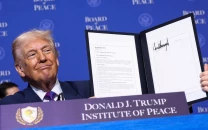East Asia’s changing landscape
Chinese power is set to grow in coming years and with this rising power, it will begin to assert itself in the world.

The writer is a Master’s student at The Fletcher School of Law and Diplomacy. He tweets @uzairyounus
Japan and China have had icy relations that stretch back decades — memories of Imperial Japan’s brutal occupation of Manchuria are fresh in the minds of most Chinese. Sensing the rising tensions, Shinzo Abe, Japan’s prime minister, recently said that relations between the two nations were similar to those between Germany and Britain prior to the First World War. In essence, the Japanese prime minister was alluding to the fact that China, like Germany, is an emerging power that is challenging the current balance of power in the region. Much like Britain, Japan is tied to the Chinese mainland through trade and investment ties. To combat this rising power, Japan is reinvesting in its military and pushing forward a reinterpretation of its Constitution that would allow Japanese military forces greater freedom to respond to attacks on allies.
A recent survey conducted by Pew Research said that just one in 20 Japanese “have a favourable attitude toward China” and “anti-Japan sentiment is quite strong in China, where 90 per cent of the public has an unfavourable opinion of Japan”. Furthermore, the recent visit by Abe to a shrine honouring war criminals from the Second World War has further angered the Chinese.
China, recognising that its neighbours are increasingly nervous, has gone on a charm offensive. Chinese President Xi Jinping and Premier Li Keqiang separately visited five Southeast Asian nations recently for broad bilateral talks. These diplomatic maneuvers showcase that China is aware of its waning popularity in the region. Neighbours are increasingly relying on economic ties with China for their growth, prompting them to pursue closer relations with China despite being nervous about its increasing power. Smaller nations have calculated that the US would check growing Chinese military power — this has not played out as expected, as the US administration deals with an increasingly uncooperative legislature.
As tensions continue to mount, chances of miscalculations that could lead to deaths on either side are increasing. The US has tried to assuage the fears of its allies in the region, but Obama’s credibility has suffered tremendously after the ill-conceived ‘red-line’ that he failed to act upon when Bashar al-Assad used chemical weapons on his own people. A weaker US is giving room to a more assertive China. With fighter jets scrambling over the ADIZ on a daily basis, it would take only one mistake to move this from a confrontation to a conflict.
The implications for the global economy will be severe from such a miscalculation. The year 2014 is being touted as the breakout year for the struggling economies of the developed world, led by the US. A conflict in East Asia, even if it is limited in nature, could spook investors and lead to a rout in financial markets. This would hurt not only the US and Europe, but also China, as businesses would eventually cut back on investments they are making in the country. For a global economy that has floundered to find its feet since 2007, a direct confrontation between China, Japan and the US would be anathema.
Chinese power is set to grow in the coming years and with this rising power, the country will begin to assert itself in the world. Whether China becomes part of the current international security framework or tries to radically alter the balance of power dynamics remains to be seen. To ensure that growing Chinese power is accommodated in a peaceful manner, it is vital that efforts are made by the international community to promote dialogue between China and its neighbours. Without dialogue, rising Chinese power will lead to conflict.
Published in The Express Tribune, February 1st, 2014.
Like Opinion & Editorial on Facebook, follow @ETOpEd on Twitter to receive all updates on all our daily pieces.



















COMMENTS
Comments are moderated and generally will be posted if they are on-topic and not abusive.
For more information, please see our Comments FAQ